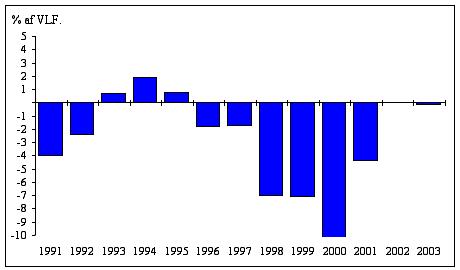News release no. 28/2002. October 1, 2002. The 2003 Fiscal Budget.
News Release
No. 28/2002
News Release
The 2003 Fiscal Budget
- Continuing economic growth based on secure public finances -
The 2003 Fiscal Budget
- Continuing economic growth based on secure public finances -
The proposed budget for 2003 anticipates a revenue surplus of ISK 10.7 billion, or the equivalent of 1.3% of GDP. Total revenue is expected to amount to ISK 264 billion and expenditures ISK 253.3 billion.
The budget reflects the continuing secure and restrained government economic policy which has been a major factor in contributing to a more balanced economic situation than has prevailed in Iceland for some time. Inflation is falling rapidly and the current account deficit has disappeared. Household purchasing power has increased steadily since 1994 and is currently higher than ever before. Interest rates are dropping and both personal and corporate debt has decreased substantially.
A responsible public spending policy and goal-directed actions to improve the situation of both corporations and individuals has provided business life with the necessary impetus for a new era of economic growth to commence in the coming year.
|
Public finances 2001-2003
|
||||
| In ISK billions, current prices |
Accounts 2001
|
Budget 2002
|
Estimates 2002
|
Budget 2003
|
| Revenue |
237.4
|
257.9
|
263.6
|
264.0
|
| Expenditure |
228.7
|
239.4
|
246.4
|
253.3
|
| Revenue Balance |
8.6
|
18.5
|
17.2
|
10.7
|
| Net financing balance |
-26.0
|
38.3
|
20.7
|
10.1
|
The Treasury outcome, without irregular expenditures and revenues (e.g. pension fund obligations and profits from sales of assets) is an anticipated ISK 11 billion surplus.
|
Outcome without irregular items 1999-2003
|
||||||
|
Accounts 1999
|
Accounts 2000
|
Accounts 2001
|
Budget 2002
|
Estimate 2002
|
Budget bill
2003 |
|
| Revenues in excess of expenditure |
23.6
|
-4.3
|
8.6
|
18.5
|
17.2
|
10.7
|
| Irregular expenditure |
19.0
|
37.6
|
8.5
|
8.8
|
8.8
|
8.8
|
| Irregular income |
16.0
|
3.8
|
1.1
|
15.5
|
14.4
|
8.5
|
| Revenue surplus before irregular items |
26.6
|
29.5
|
16.0
|
11.8
|
11.6
|
11.0
|
Relative decrease in revenue and expenses The total expenditures and revenue decrease as a proportion of GDP, as do the taxes collected. The main factor here is the slow growth of operating expenditure, which can be traced in part to special restructuring measures.
Budget expenditures Investment expenditure is practically unchanged and interest expenditure decreases. However, transfers to households, including social security benefits and children's benefits, increase in excess of price level increases, partly because the rights of both men and women to childbirth leave will be equalised next year. Contributions to shared housing for the handicapped has been increased to shorten waiting lists. The operating base of health care institutions has been strengthened. Contributions to new road works are increased by just over 20% from the budget provisions as the result of special ISK 1.2 billion financing from the profits of sales of assets. On the other hand, many major projects will conclude this year and next year, including the building of the new Annexe of the Althingi, a children's hospital and a new wing for the Iceland University of Education. Finally, the Treasury's interest expenditure is estimated to decrease by ISK 500 million from this year to the next.
Budget revenues Tax revenues for 2003 are expected to be unchanged in real terms. Nonetheless, the impact of the reduction in corporate income tax from 30% to 18%, and a reduction of more than 50% in individual and corporate net worth tax, will be felt during the year. This will be balanced by an increase of half a percentage point to the social insurance fee paid by corporations. The special income tax is reduced from 7% to 5%. The tax deduction for share purchases ceases as of the end of this year, but this change will not affect tax revenues until 2004.
Macroeconomic premises The budget is based on the national economic forecast for 2003 which assumes a growth rate next year of 1S%. It also assumes that inflation will decline rapidly to be around 2R% between 2002 and 2003. The purchasing power of household disposable income is expected to increase by 1S% in 2002 and 2% in 2003. Finally, it forecasts no current account deficit for this year or next year.
Current account deficit disappears A sizeable increase in national expenditure resulted in a growing current account deficit which peaked in 2000. Since that time expenditure has decreased rapidly and the current account deficit has thus fallen rapidly. The revised economic forecast for 2002 predicts that the balance of trade will have reached equilibrium and the same is true of the coming year. This development reflects the flexibility of the Icelandic economy, which can be attributed not least to the structural changes introduced by the government in recent years.
Current account 1991-2003


Savings increase and national debt decreases National savings have increased substantially recently and are expected to be around 19%, after being just under 14% in 2000. Positive foreign trade developments have led to a reduction in the net national debt. The country's net foreign debt decreased this year and a further decrease is predicted for next year.
The importance of restraint in public finances It is important to continue along this path. A cautious and responsible public finance policy, aimed in particular at keeping the growth of expenditures within moderate limits, encourages stability in economic affairs. At the same time, it opens up possibilities for further tax reductions, both for individuals and corporations, and is thus an important premise for further industrial development and improved standards of living.
Ministry of Finance, 1 October 2002
